Van Life vs RV Life 5 Biggest Differences
RV living has been around for quite a while, but recently camper van conversions have been gaining popularity at breakneck speed.
Although both modes of travel offer comfort, minimalism, and a sense of adventure, the lifestyles are incredibly different.
My husband and I have been living in a camper for two years. And I’d be lying if I didn’t say I wanted a little bit of extra space. But there are pros and cons to everything, and ultimately van life won out for our lifestyle.
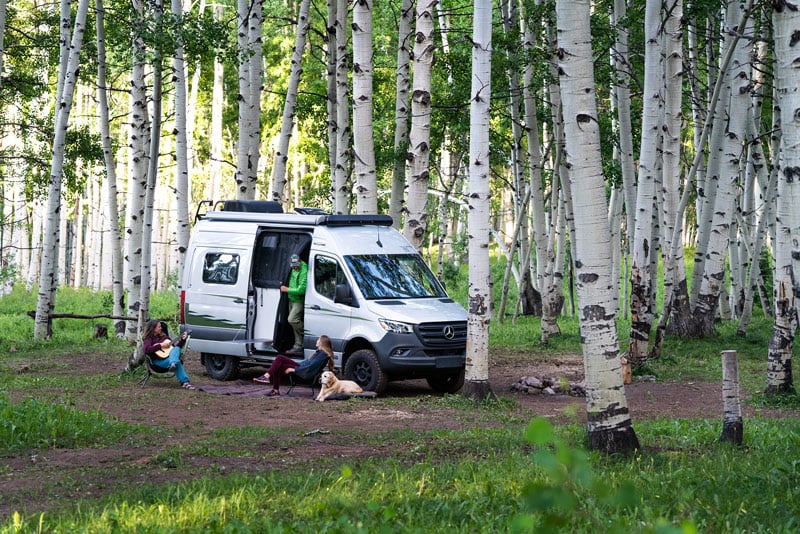
That said, van life isn’t for everyone. In fact, RV life has quite a bit of perks on its own.
In this article, we’re going to lay out some of the pros and cons between van life vs RV life to help you decide the best way to travel.
Driving Experience
Camper vans are of course much smaller than RVs and that can be good or bad depending on which type of trip you’re planning to take.
Small campervan conversions allow you to more easily fit into a parking lot, navigate tight turns, and grab some fast-food along the way. The only way you can do that in an RV is if you travel with a trailer and tow vehicles.
With an RV you have to do a bit more planning. There is no such thing as just stopping for a quick bite and parallel parking is nearly impossible.
You’re also going to have to drive slower in a large RV, and perhaps even use a dedicated GPS designed to help avoid low bridges or tunnels.
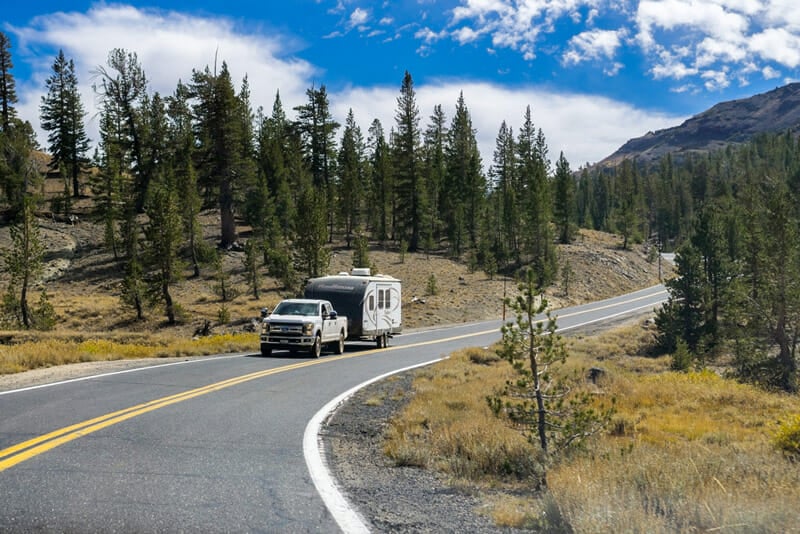
Exploration
Because of the less convenient driving experience, you’re not as likely to stop and tour random points of interest in your RV.
On the flip side, you’ll always have a bathroom in your vehicle so there’s less need to stop!
Since van life allows you to take more frequent breaks, it’s easier to plan for short or overnight trips.
Amenities
Number of beds
The biggest difference between van life and rv life is the amenities. Motorhomes allow you to sleep more passengers so there’s enough space to bring the whole family.
Alternatively, a camper van generally has enough bed space to fit one or two people comfortably.
If you’re planning to travel with pets, there’s a lot more space in an RV. And since motorhomes often come with air conditioning units, it’s a lot easier to leave your pets inside the vehicle while you go for a hike!
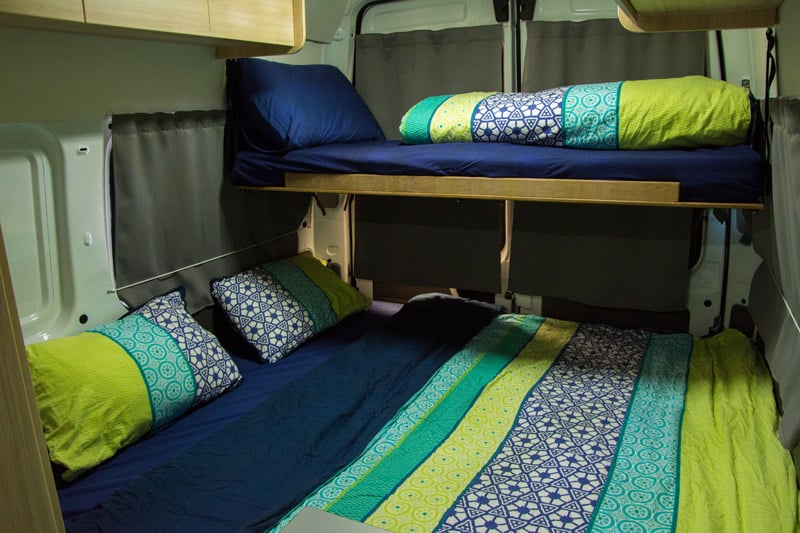
Bathrooms
The best part about RV life is the fact that every motorhome or fifth wheel will come with a bathroom. You get a toilet, shower, and in some cases even more than one!
Sinks and running water make RV life more comfortable and much more akin to living in a standard house.
Living Space
A motorhome is significantly larger than a Class B RV. With these vehicles you get lots of living space and plenty of room for a kitchen, dining area, and separate sleeping quarters.
If you’re lucky enough to score a vehicle with slide outs than that small space gets even larger!
A converted van is so small that you’re going to need to re-arrange things just to find seating.
Ultimately, you’re going to find more comfort outside than inside when doing van life.
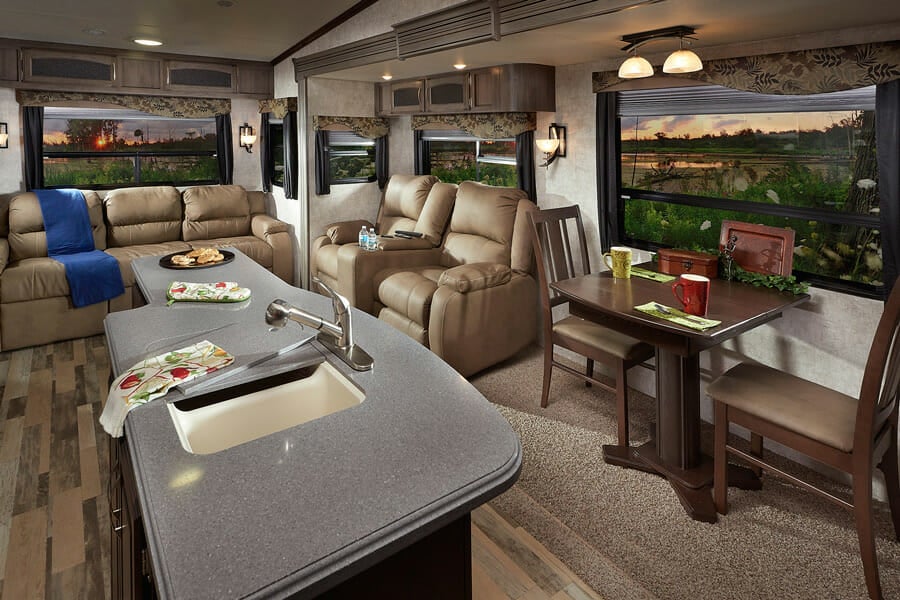
Kitchen Area
A motorhome is similar to a tiny apartment. You can get more amenities like full-size refrigerators, ovens, microwaves, and even dishwashers!
The best part about an RV or travel trailer is that there is plenty of storage space for water. Large holding tanks allow you to wash the dishes, run the sink, and take showers without worry.
In a camper van, water is always scarce. You have to pay careful attention to every drip you’re using throughout the day.
Storage Space
Motorhomes have a large exterior storage area where you can fit plenty of adventure equipment like kayaks, bicycles, and camping equipment.
In a cargo van, there is hardly any room for extra equipment, it’s truly a minimalist lifestyle.
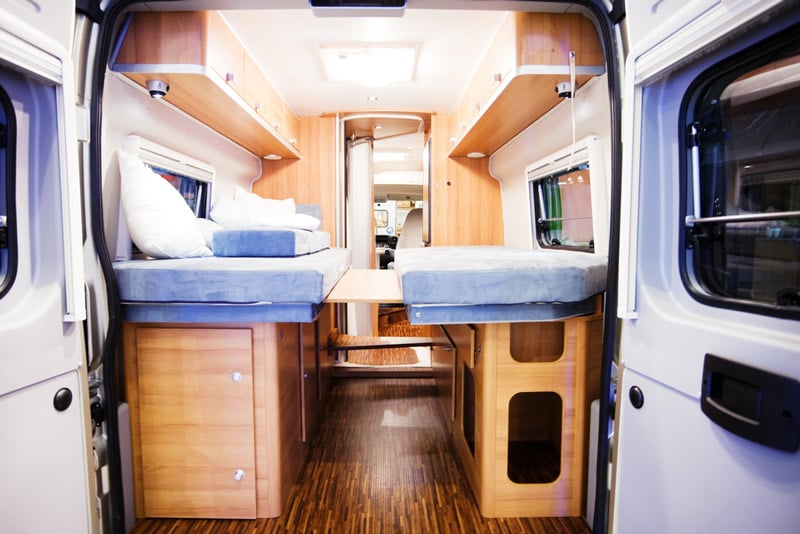
Spending the night
Would you rather sleep in a micro-apartment? Or go luxury camping? That’s essentially the choice you have to make when choosing between van life and rv life.
Campsite selection
With the van life, you have a lot more freedom to go boondocking, stealth camping, or urban camping in the big city.
With the RV lifestyle, you’re mostly limited to campgrounds unless you have a off-grid setup which allows you to park in more rugged locations.
An RV is much larger so you won’t be able to stealth camp just anywhere.
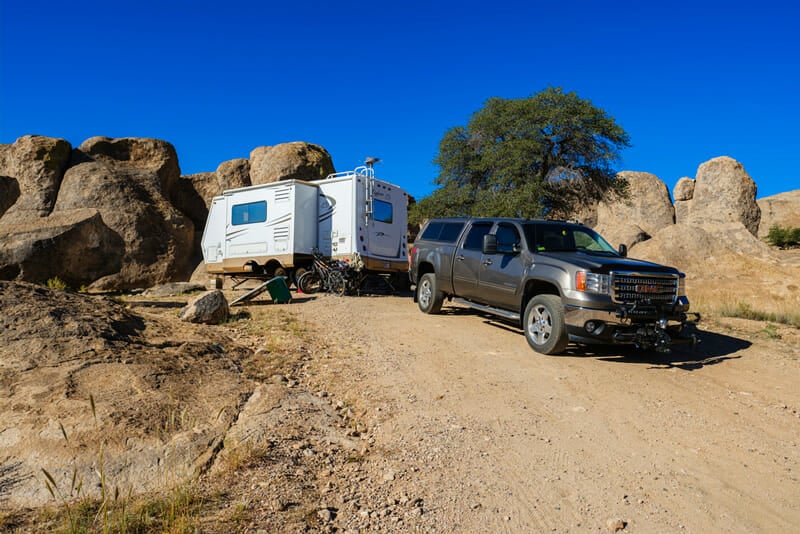
Campsite cleanup
Van lifers are lucky when it comes to campsite cleanup because they don’t have nearly as much stuff to haul around. You can easily pack the van up and move from one location to the next at the drop of a hat.
An RV requires much more planning in general. You also have to take everything with you when you decide to leave the area unless you have a second vehicle.
Finances
Vehicle Cost
Camper van conversions come in many shapes and forms, as do RV campers. On the surface, a camper van might appear to be cheaper, but that’s not necessarily the case.
If you do a DIY camper van build, then you can certainly cut back on the cost. In fact, we did our entire build for under $8,000.
On the surface van life might seem like the more affordable option. But, conversion van companies can charge upward of $100,000 for a Class-B camper.
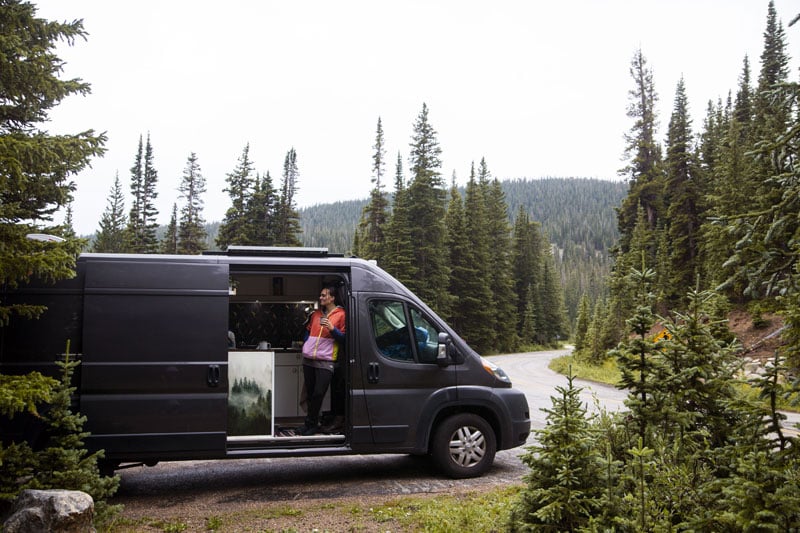
Camping fees
After the initial cost, there’s camping fees. When you’re traveling in an RV or fifth wheel camper, chances are good that you’re going to want electric hookups, and perhaps even a water line.
Boondocking is an option for any vehicle, but it’s a lot harder to do with a large motorhome.
In a camper van, you can easily go urban camping or drive up hairpin curves to the perfect free camping spot.
RV travelers are going to spend a lot more on overnight fees. It’s worth noting that the average cost of a campsite with full RV hookups is around $50 according to Cruise America.
Most people choose to do a mix of both cheaper camping options and nicer paid campgrounds. Either way, it’s less expensive than paying rent!
Can you get discounts for staying at campsites frequently?
Yes! There are a number or RV clubs you can join that give big discounts on RV campsites across the US. To join an RV club, you pay a yearly fee (typically $70-$100) and receive 25-50% off participating RV parks.
Often discount RV clubs will pay off in less than a week of travel. That makes them worth it for most RV travelers. Some clubs also offer health insurance packages, mail services, travel assistance and more.
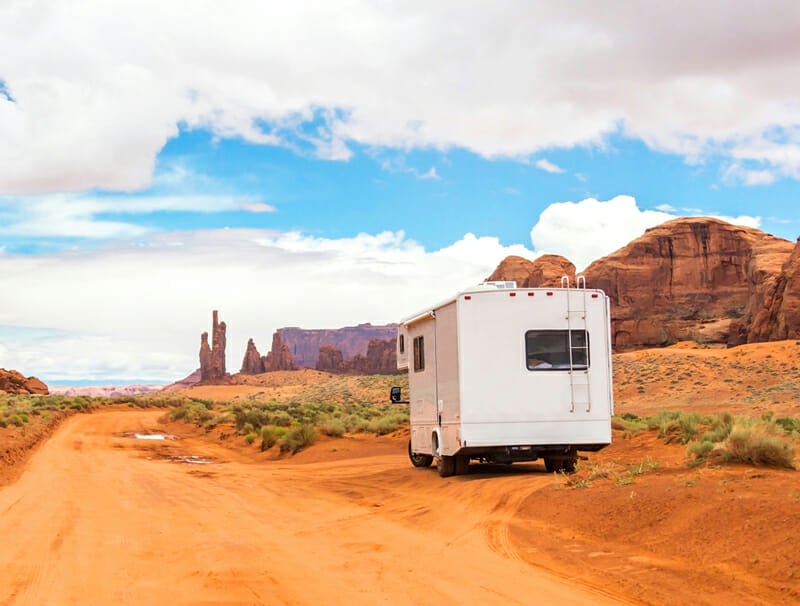
Gas prices
When if comes to fuel economy, a small van is preferred for the van lifer on a tight budget. Even a small RV like a Class C can get pretty pricey because they are not the most fuel efficient vehicles.
Travel trailers are equally expensive.
Even though you get the benefit of a daily driver, gassing up the tow vehicle can be a deal breaker for your pocketbook.
Insurance
While an RV doesn’t have great fuel economy, there it does win out is RV insurance prices.
Most van life vehicles are subject to regular car insurance which can be significantly more expensive than RV insurance.
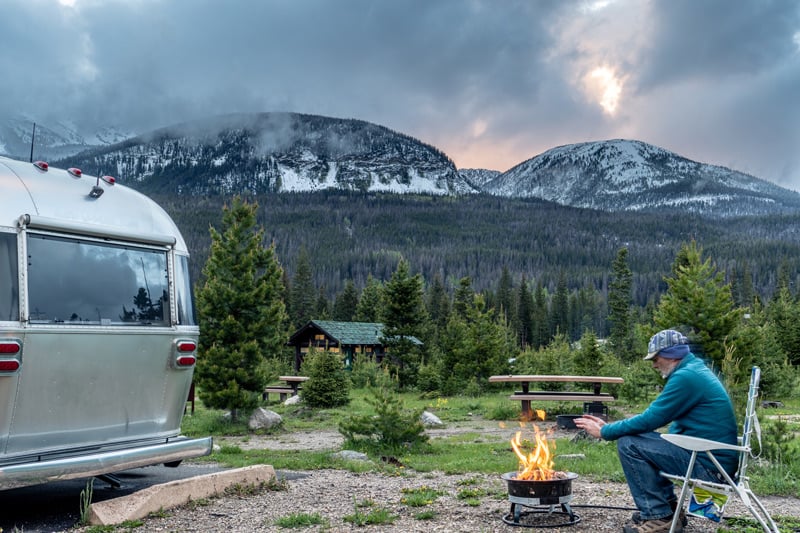
The Bottom Line: Van Life or RV Life?
Van life pros and cons
Choose van life if you’re wanting to get better gas mileage, more options for parking, better opportunities for free camping, and a greater sense of adventure.
Van life is perfect for couples and solo travelers, people who don’t need a lot of storage space, and those living on a tighter budget.
A small camper is great for stealth camping in the big city and gets better fuel economy as well.
RV life pros and cons
RV life is good for people who want to have a more comfortable lifestyle, travel slower, and enjoy more amenities. It’s a lot more similar to living in a house without the high rent prices.
A motorhome might be less drivable, but it can tow a second vehicle for quick trips to the store when you have a hard time finding somewhere to park.

This Post Has 0 Comments